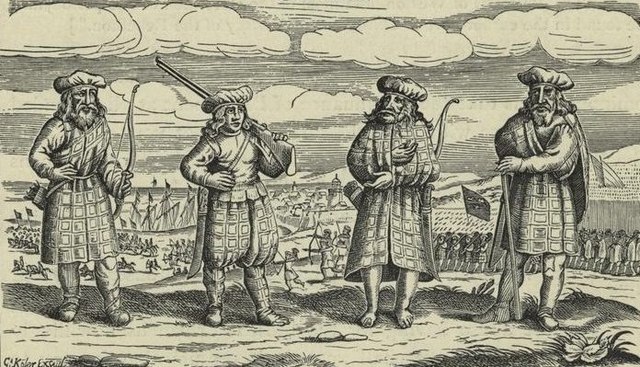Angus Du Mackay, 7th of Strathnaver
Angus Du Mackay, 7th of Strathnaver was the seventh chief of the Clan Mackay, a Highland Scottish clan. He is recorded in the 15th-century Scottish chronicle, Scotichronicon, as Enneas-en-Imprissi meaning Angus the Absolute due to his power of commanding 4000 men.
"Tuiteam"
The Bass Rock, where Neil, son of Angus Du Mackay was imprisoned after the Parliament of Inverness in 1427
Clan Mackay is an ancient and once-powerful Highland Scottish clan from the far North of the Scottish Highlands, but with roots in the old Kingdom of Moray.
A Victorian era romantic illustration of a MacKay clansman by R. R. McIan.
A 17thC German print assumed to show men of Mackay's Regiment in Stettin during the Thirty Years' War. The original caption states, "They are a strong and hardy people who survive on little food. If they have no bread, they eat roots [turnips may be intended]. When necessary, they can cover more than 20 German miles in a day's forced march. [1 German mile = 4¾ English miles] Besides muskets, they carry bows, quivers and long swords."
In 2004 six "Mackay Country" signs were installed welcoming people to the area that was once the territory of the clan. They were placed at Kylesku, Achfary (both in parish of Eddrachillis), Forsinard, Dalvina, Crask (all three in parish of Farr) and one on the A836 road at the border between the counties of Caithness and Sutherland. In 2014 the latter was vandalized.
Tongue Bay, Sutherland, c.1822, with the House of Tongue in the background which was formerly the seat of the chiefs of the Clan Mackay after they abandoned Castle Varrich and Borve Castle in the 16th century






